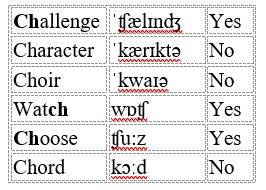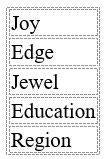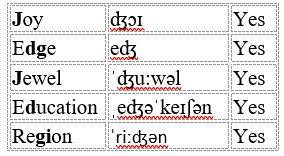Our next consonant pair are / ʧ / (voiceless) and / ʤ / (voiced). You may notice that these are all symbols you’ve seen before! Thankfully, they are both pronounced as you would expect them to:
/ ʧ / is made up of / t / followed by / ʃ /
/ ʤ / is made up of / d / followed by / ʒ /.
In order for / ʧ / and / ʤ / to sound right, you need to say their two component sounds together with no pause (and no ə) in the middle of them.
/ ʧ / often represents the letters ‘ch’ such as in ‘challenge’, ‘chip’, ‘chew’ and ‘which’, but this is not always the case. Take a look at the words below: in which words are the letters ‘ch’ pronounced as / ʧ /?

Did you get them all right?

As for the sound / ʤ /, this is often represented by the letter ‘j’ in English, especially when it’s at the beginning of a word. But again, / ʤ / can be represented by other letters too. Take a look at this list. Which words contain a / ʤ / sound?

Here are the answers:

So in fact, all of the above spellings use the sound / ʤ /!
If you’re not familiar with these sounds or not sure how to produce them, listen to them as much as you can, whether said by a real human being or on a website. You probably know what I’m going to say next, but in case you’re ‘dipping in’ to these blogs, here is my advice again: How to learn phonetic symbols and their corresponding sounds.


Add comment
Comments